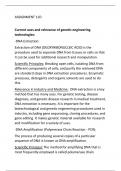ASSIGNMENT 11D
Current uses and relevance of genetic engineering
technologies:
-DNA Extraction:
Extraction of DNA (DEOXYRIBONUCLEIC ACID) is the
procedure used to separate DNA from tissues or cells so that
it can be used for additional research and manipulation.
Scientific Principles: Breaking open cells, isolating DNA from
different components of cells, and purify the retrieved DNA
are standard steps in DNA extraction procedures. Enzymatic
processes, detergents and organic solvents are used to do
this.
Relevance in Industry and Medicine: DNA extraction is a key
method that has many uses. For genetic testing, disease
diagnosis, and genetic disease research in medical treatment,
DNA extraction is necessary. It is important for the
biotechnological and genetic engineering procedures used in
industry, including gene sequencing, cloning procedures, and
gene editing. It makes genetic material available for research
and modification for a variety of uses.
-DNA Amplification (Polymerase Chain Reaction - PCR):
The process of producing several copies of a particular
sequence of DNA is known as DNA amplification.
Scientific Principal: The method for amplifying DNA that is
most frequently employed is called polymerase chain
, reaction (PCR). It involves repeatedly heating and cooling the
DNA to denature it, letting primers to stick together, and
creating new DNA strands using DNA polymerase.
Relevance in Industry and Medicine: Both industry and
medicine depend on PCR. PCR is a tool used in medicine to
diagnose illnesses, find changes in DNA, and identify
pathogens. It is used in the workplace for forensics,
sequencing DNA, genetic fingerprinting, and the creation of
recombinant DNA-based items. PCR has modified genetic
research and offers a wide range of uses in personalised
medicine, medication development, and diagnostics.
-Gel Electrophoresis:
When separating DNA or parts of proteins based on size and
charge, a process called gel electrophoresis is performed.
Scientific Principles: In order to perform gel electrophoresis,
charged molecules must move across a gel matrix while
subjected to an electric field. Smaller molecules travel
through gels more quickly and over greater distances than
larger ones when DNA or samples of proteins are dropped
into wells and an electric current is applied.
Relevance in Industry and Medicine: Gel electrophoresis is
Essential for Genetic Engineering and Biomedical Research. It
is employed to examine DNA fragments in the context of
gene mapping, DNA fingerprinting, and confirming the
efficacy of DNA amplified or gene editing. Gel electrophoresis
is used in medicine to examine patient samples' DNA, identify




